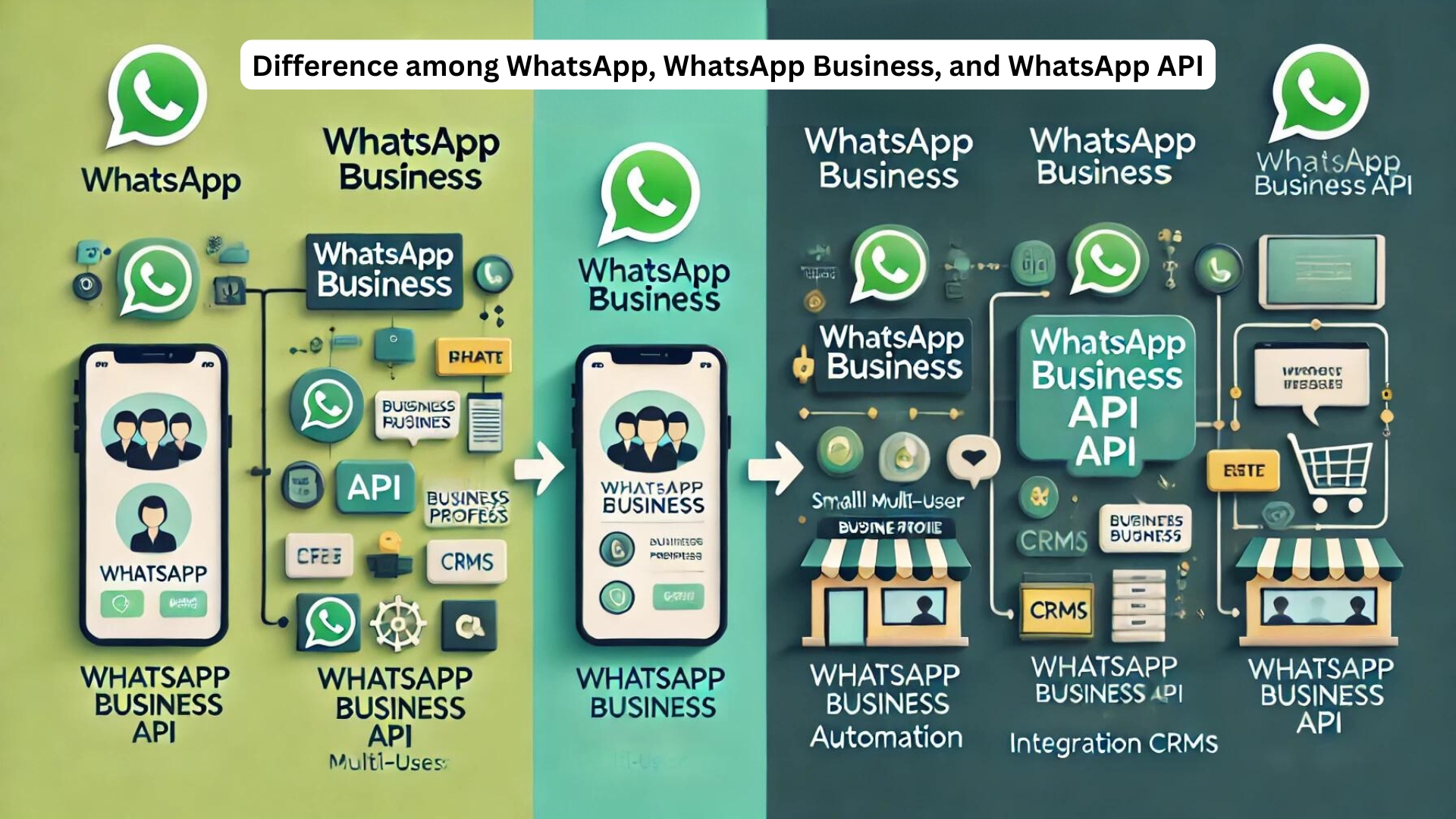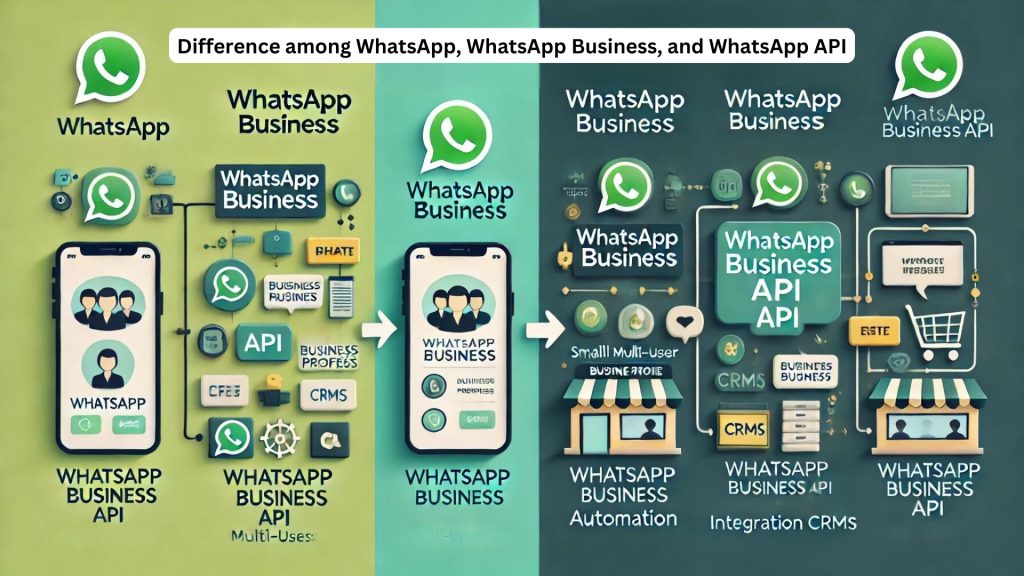In today’s interconnected world, messaging apps like WhatsApp have become essential communication tools for both personal and business use. WhatsApp’s popularity is undeniable, with over 2 billion active users globally. The platform’s seamless messaging, voice, and video call capabilities have made it the go-to app for personal communication. However, WhatsApp has also evolved into a key business tool, with the introduction of WhatsApp Business and the WhatsApp Business API.
As businesses increasingly embrace WhatsApp to engage with their customers, it’s crucial to understand the differences between these three services. While the core functionality of messaging remains the same, each offers distinct features designed for different types of users and business needs.
In this article, we will explore in-depth the differences between WhatsApp, WhatsApp Business, and the WhatsApp Business API, and how each can be used effectively by individuals and businesses.

1. WhatsApp: The Foundation for Personal Communication
Let’s start with the original and widely-used version: WhatsApp. Launched in 2009, WhatsApp is primarily designed for personal communication, offering a simple and reliable way for people to stay connected.
Key Features of WhatsApp:
- Instant Messaging: WhatsApp allows users to send text messages, images, videos, voice messages, and documents instantly.
- Voice and Video Calls: Users can make high-quality voice and video calls to individuals or groups.
- Group Chats: WhatsApp supports group chats with up to 1024 members, making it easier for users to communicate with family, friends, or colleagues.
- End-to-End Encryption: Privacy is a core feature of WhatsApp. All messages, calls, and media shared on the platform are protected by end-to-end encryption, meaning that only the sender and recipient can read them.
- Status Updates: Users can share temporary status updates that disappear after 24 hours, similar to stories on platforms like Instagram or Snapchat.
Limitations of WhatsApp for Business Use:
While WhatsApp excels as a personal communication tool, it is not ideal for businesses due to several limitations:
- Single User Access: WhatsApp accounts are tied to individual phone numbers and can only be accessed from one device at a time. This makes it difficult for businesses with multiple team members to manage customer interactions.
- No Automation: WhatsApp does not offer automation features like sending automatic responses or creating message templates.
- Limited Branding: Businesses cannot customize their profiles or add verification badges, making it harder to establish credibility with customers.
2. WhatsApp Business: Tailored for Small Businesses
Recognizing the need for businesses to connect with customers via its platform, WhatsApp introduced the WhatsApp Business app in 2018. This app is specifically designed for small businesses looking to manage communication with their customers.
Key Features of WhatsApp Business:
- Business Profile: WhatsApp Business allows companies to create a professional business profile that includes essential information like the company’s name, logo, address, website, and operating hours. This helps customers verify that they are dealing with a legitimate business.
- Labels: The app offers the ability to organize contacts or chats using labels such as “New Customer,” “Pending Order,” or “Paid.” This helps businesses track customer interactions more efficiently.
- Quick Replies: To improve response times, WhatsApp Business lets users create quick replies to common customer inquiries. These are pre-saved messages that can be easily sent with a few taps.
- Automated Messages: Businesses can set up automated greeting messages to welcome new customers or send “away” messages when they are unavailable.
- Catalogue Feature: WhatsApp Business includes a catalogue feature where businesses can display their products or services. Customers can browse these catalogues directly within the chat window, making it easy to explore offerings and even place orders.
Limitations of WhatsApp Business:
While WhatsApp Business is a step up from the regular WhatsApp app for small businesses, it does have its limitations:
- Single Device Access: Similar to the personal version of WhatsApp, WhatsApp Business can only be accessed from one device at a time. For small teams, this can be a challenge.
- No Integration with Larger Systems: WhatsApp Business doesn’t integrate well with larger CRM systems, making it difficult for medium-to-large enterprises to manage customer data at scale.
- Limited Message Automation: While the app allows for basic automation, it is still not enough for businesses handling large volumes of customer interactions.
3. WhatsApp Business API: The Solution for Medium to Large Businesses
For medium-to-large enterprises that require a more robust solution, WhatsApp offers the WhatsApp Business API. Launched in 2018, the API is designed for businesses that need to handle large-scale customer interactions, offering a range of features that provide greater flexibility and control.
Unlike WhatsApp and WhatsApp Business, the WhatsApp Business API is not an app but a programmable interface that integrates with a company’s existing customer service and communication platforms.
Key Features of WhatsApp Business API:
- Multi-User Access: One of the most significant advantages of the WhatsApp Business API is that it allows multiple agents to manage customer interactions simultaneously from a single WhatsApp number. This is perfect for businesses with customer service teams or sales departments.
- Automated Messaging and Bots: The API enables advanced automation features, allowing businesses to create chatbots that can automatically handle customer queries, schedule messages, and respond to common questions. This reduces the burden on human agents and improves customer service efficiency.
- CRM Integration: The WhatsApp Business API integrates seamlessly with CRM systems, customer service platforms, and marketing automation tools. This integration allows businesses to track customer interactions, generate leads, and offer personalized communication at scale.
- Rich Media Messaging: Just like the WhatsApp Business app, the API allows businesses to send rich media messages, including images, videos, documents, and interactive buttons. This feature helps enhance the customer experience by providing more engaging and informative content.
- Message Templates: Businesses using the API can send pre-approved message templates for specific use cases such as appointment reminders, order confirmations, and shipping notifications. These templates help maintain consistent and professional communication with customers.
- High-Level Security: The WhatsApp Business API ensures secure communication with end-to-end encryption and compliance with data privacy regulations like GDPR. This is especially critical for businesses that handle sensitive customer information.
- Verified Business Account: Businesses using the WhatsApp Business API can get their account verified, adding a green checkmark badge to their profile. This verification builds trust with customers and enhances the company’s reputation.
How the WhatsApp Business API Works:
Unlike the WhatsApp and WhatsApp Business apps, the API does not have a user interface. Instead, businesses need to work with an official WhatsApp Business API provider like Secondtick.com to integrate the API into their systems. The provider helps manage the connection and facilitates the setup of customer support or communication tools.
Use Cases for WhatsApp Business API:
- Customer Support: The API allows businesses to offer 24/7 customer support through automated chatbots, ensuring prompt responses to customer inquiries. It can also route conversations to human agents when necessary.
- Transactional Notifications: Businesses can use the API to send transactional messages such as order updates, delivery confirmations, and billing notifications.
- Marketing Campaigns: While WhatsApp prohibits businesses from sending unsolicited promotional messages, the API can be used for opt-in marketing campaigns. Businesses can engage customers with personalized offers, product updates, or event reminders.
Limitations of WhatsApp Business API:
- Cost: The WhatsApp Business API is not free. Businesses need to partner with an official WhatsApp API provider like SecondTick and pay for services based on message volume and other factors.
- Technical Setup: The API requires technical expertise for integration with a company’s existing systems. Businesses may need to rely on developers or third-party providers to set up and maintain the API.
- Message Templates: While the API allows businesses to send messages proactively, they must use pre-approved message templates. This means that businesses cannot send freeform promotional messages without customer consent.
Choosing the Right Solution for Your Business
Now that we’ve explored the features, benefits, and limitations of WhatsApp, WhatsApp Business, and the WhatsApp Business API, the question remains: which one is right for your business?
For Individuals and Sole Proprietors:
- WhatsApp is the ideal solution for individuals or sole proprietors who need a simple and reliable messaging platform for personal use or limited business interaction.
For Small Businesses:
- WhatsApp Business is designed specifically for small businesses that need an affordable and easy-to-use tool for customer communication. With features like business profiles, quick replies, and catalog creation, it offers everything a small business needs to manage customer interactions efficiently.
For Medium to Large Businesses:
- WhatsApp Business API is the best choice for medium to large businesses that require scalable solutions for customer communication. With advanced automation, CRM integration, and multi-user access, the API allows businesses to handle large volumes of customer queries, transactional messages, and marketing campaigns effectively.
Final Thoughts
WhatsApp has transformed the way we communicate, and its evolution into a business tool has unlocked new opportunities for customer engagement. Whether you are an individual, a small business, or a large enterprise, WhatsApp has a solution tailored to your needs.
For businesses looking for scalability, enhanced automation, and multi-agent access, the WhatsApp Business API offers a powerful platform. With official providers like Secondtick.com, integrating the API into your business operations becomes seamless, helping you engage customers efficiently while ensuring compliance
